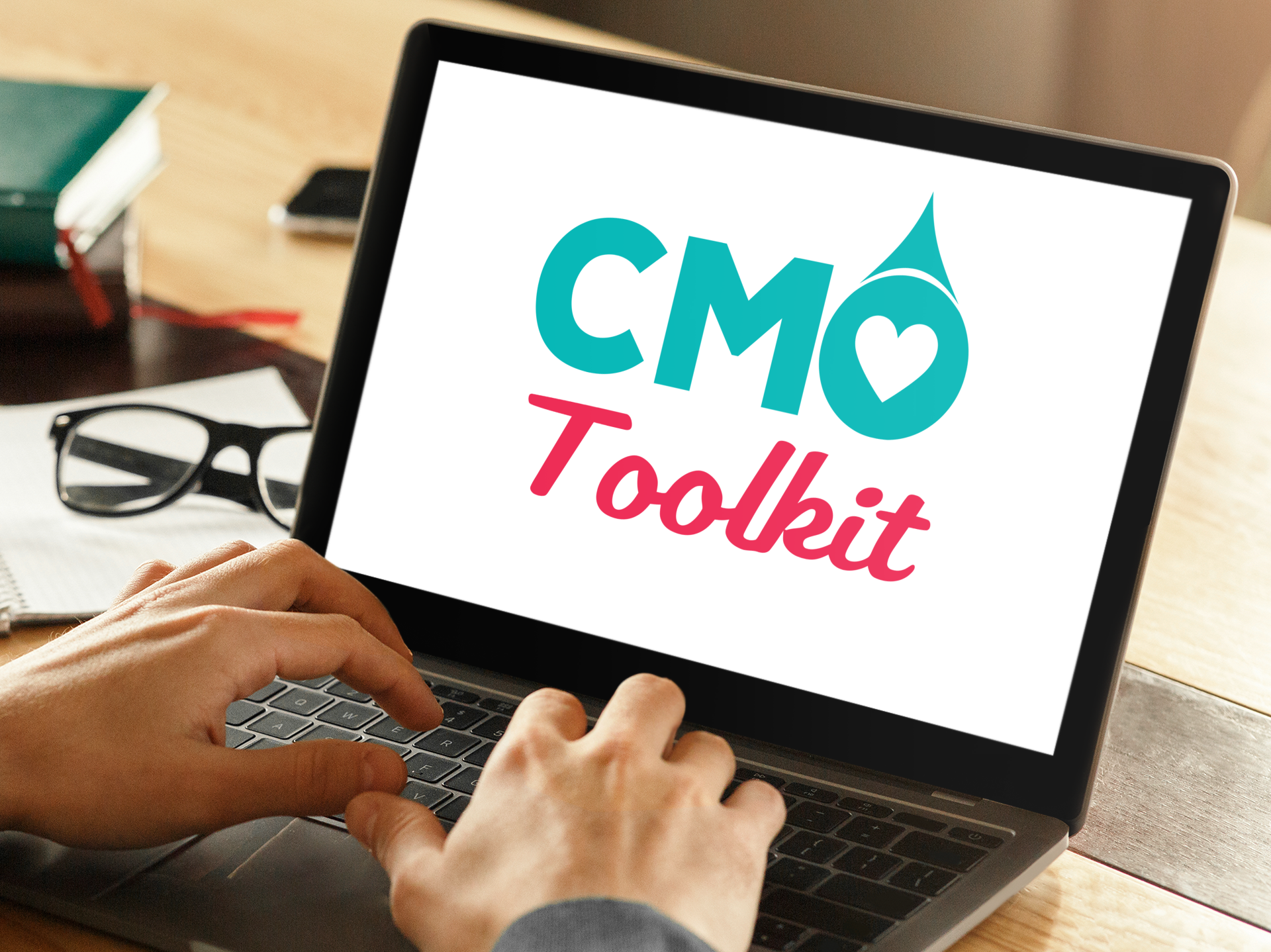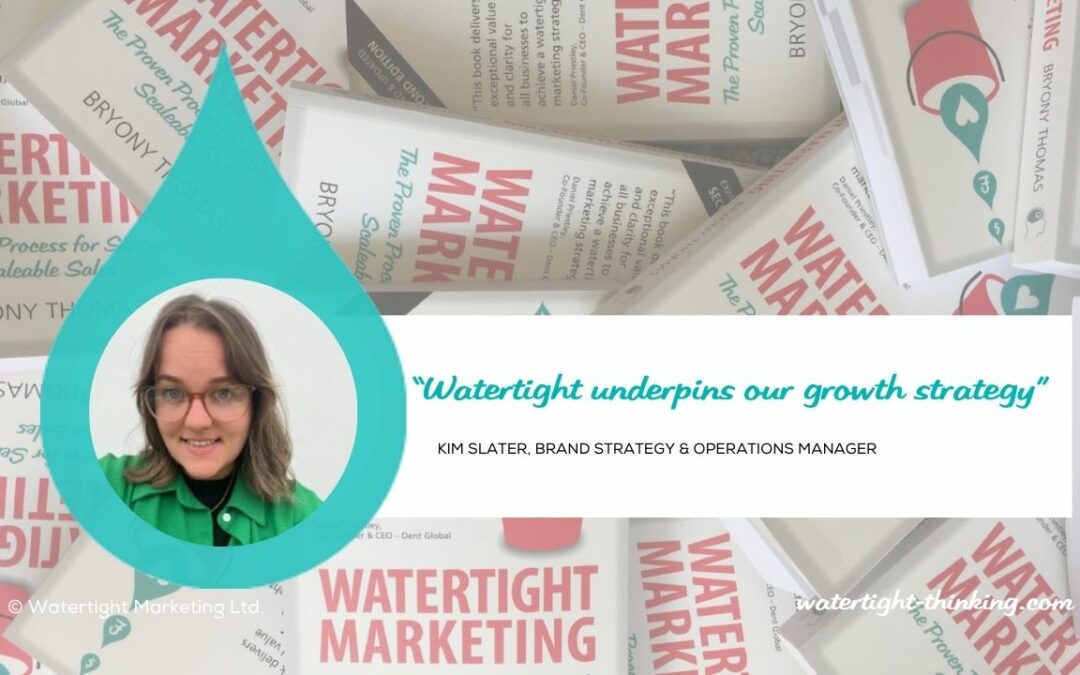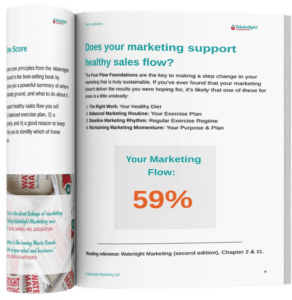Reading Time: 10 Minutes
Our latest interview is with Kim Slater which we did when she was Brand Strategy & Operations Manager for FD Works, based in Bristol. Kim has worked with our approach and used our tools for several years now. She talks to Rachael, our MD. Interview by Rachael Wheatley, Watertight Business Thinking.
Rachael Wheatley: Hi Kim, Lovely to speak with you today. I’m going to start off by asking: how did Watertight change your approach to marketing?
Kim Slater: I would say the biggest impact it’s had is simplifying it. Marketing is constantly developing, there’s always a new trend, there’s always a new way of thinking, AI is obviously coming in. It can feel really overwhelming, particularly when you’re a solo marketer, and trying to work out what’s worth spending time on. As you know, Jonathan, the founder of FD Works, is very creative, and comes up with ideas constantly. Watertight allows me to take his ideas and ask, does this fit in with our strategy? Is this our focus right now? Should I shelve it for a later time? Watertight helps me streamline my thinking and align it to our strategy and business goals.
Rachael Wheatley: I know you first came to Watertight as an apprentice in your first role in marketing, working through one of our courses over a twelve month period. Now you’re more experienced and you head up the marketing function, what do you think it adds for the more senior, seasoned experienced marketer?
Kim Slater: What I’ve found is that I’m able to spot the shape of the activities that are happening within the business. It allows me to categorise my thinking more, so that I can make sure that we’re focusing on the right things at the right time to the right level, and we’re not wasting our time by spending too much time in places that we are not ready for or isn’t a priority. I’m now working with Lucy, who’s a content creator, and also JJ, who is an accountant, on setting up the sales pipeline and sales department. They’re finding their feet and doing lots of experimenting. It’s really easy for me to see what they’re doing based on the Watertight framework.
They can get themselves tangled up in knots sometimes so it’s really helpful for me to go, right, lets go back to Watertight thinking, and look at what is it that you’re trying to achieve here? What parts of the framework are you looking at? It really helps me simplify it for them, but also make sure that we’re consistent. I think consistency is a lot of the battle, so we’re not wasting money, we’re not wasting resources. It helps me allocate budget and time, and again relating it back to a really simple framework, instead of getting carried away with trends and fads that probably won’t have much of an impact.
Rachael Wheatley: What you’ve mentioned there is about being able to use it as a lens for the whole business to look through. You might be the person who knows most about marketing, but you still need contributions and buy-in from others. So, you can use the frameworks to help explain marketing to the whole business and why you’re doing what you’re doing.
Kim Slater: Yes that’s exactly it. They have their own areas of expertise. I’m not a sales expert, I’m not a content expert. So while they go really deep into certain areas, we all bring it back to the Watertight frameworks and are all on the same page all the time, rather than speaking in our own language in different areas.
Rachael Wheatley: And I guess that in that sense, a common language really helps, doesn’t it, as a kind of facilitator of thinking, so you will know what you’re talking about and that it’s the same things?
Kim Slater: It definitely makes it much more clear, especially because like I said, they’re both quite new to the roles. I remember that feeling of getting tied up in knots and feeling quite lost. And it’s a really nice feeling to be able to just jump on a call with them quickly and use that common language and just see the light switch go on and they go, yes, I remember.
Rachael Wheatley: What influence do you feel Watertight had on you personally?
Kim Slater: It’s definitely given me a lot more confidence. I think part of my job is saying “no” to the rest of the business sometimes. And being an expert in my role, being able to say this doesn’t align with the strategy or this isn’t a focus right now. And I can point to, again, a common language within the whole company, I have a catch up every six months or so where I explain very briefly what our strategy is using the Watertight language. So the rest of the team is familiar with it. Jonathan has 30 years of experience and he’s very confident in his role. It’s given me the confidence to say to him, no, this isn’t the right thing that we should be doing right now.
I think imposter syndrome is a bit of a controversial topic at the moment. When people talk about it, they might think: is it real, is it not real? To me, whatever you want to call it, I certainly lacked confidence in my decision making at times and being able to bring it back to a super clear strategy that is proven, is brilliant. I’m using your expertise to backup my own!
Rachael Wheatley: It sounds like it also helped to build your credibility internally as well?
Kim Slater: Definitely, I would say being able to point to a well thought out evidence-based framework has been really helpful for me. I’m not saying trust me, because I know everything; I’m saying, trust me, I’m listening to the experts.
Rachael Wheatley: Can you think of a couple of examples of how you’ve applied the thinking or frameworks in your role in the business?
Kim Slater: When I first came in, it was really about getting consistency around engaging with our already loyal customers. We worked on that and now we’ve moved on to a different area. So part of hiring Lucy as a content creator was about getting some action behind the top end of the funnel. I see my job as making sure that activity is constant. Over time, I think it’s really easy to shift your focus and go right, we completed that, and then just forget about the customers. But then they’re not your current focus and they don’t have the same drive behind them. I’m now able to look things at a little bit more high level, because I don’t do so much of the detailed work. I’m able to keep an eye on the shape of the business, the shape of the activities that we’re doing.
So the test that you have, the way you fill in the questions, and it tells you, what you should be focusing on, I run through that every now and again, that just make sure we’re prioritising the right things. I love that test because it’s just so simple (see What are the Thirteen Touchpoint Leaks and Chapter 2 of the book to find out more about this assessment). But it does make sure that we’re still implementing new activities to look after our loyal customers, and we’re not taking them for granted. So, it brings me back to the basics over and over again. As we move on, and we do bigger, more exciting things, we’re not forgetting our foundations.
Rachael Wheatley: What challenges or problems do you think Watertight helps to solve?
Kim Slater: I think in a small business, often people rely on skills rather than process. So if I was to get hit by a bus tomorrow, part of my job I see it is to set up a system that can run without me. It might not grow or progress without me, but it will be maintained. Watertight gives you that really simple foundation to build processes that are reliable, consistent, relevant, and that have an impact, without relying on individual people skills. So you don’t have people who are irreplaceable that you couldn’t cope without. I have documented everything I do. So even an accountant, someone who has no experience in marketing would be able to read my documentation. Because they’re familiar with the language that we use around Watertight, they would be able to make sense of it. Like I said, we might not grow, might not expand, but they will be able to maintain our reputation. And the bottom won’t fall out of it just because I’m not around anymore.
Rachael Wheatley: What you said then is interesting. One of the things that we’ve explored more recently is the idea of marketing capability in a business. That’s not just you as an individual as a lone marketer, but a wider marketing capability that sits outside the marketing function, in sales and customer service teams but also across the business. What you described there is the virtue of including everyone because quite a lot of people have a contribution to make to marketing even if they’re not in marketing. It points to the real value of embedding Watertight and having a common language which means that it exists beyond one person.
Kim Slater: I think that’s really key. I’ve seen it evidenced in other areas of the business. If you take HR, for example, there’s one person who looks after it, we have an outside businesses that supports us. But nobody is really familiar with what goes on behind the scenes with HR. You couldn’t step in and support the business as we grow; there would be an issue in terms of how we spread that knowledge and make sure that that person isn’t overwhelmed. But I think in particular, with marketing, the team are the people who are communicating with the clients every day, being able to spot opportunities for testimonials, or case studies, being able to spot opportunities where they can upsell. They can’t do that without a very basic understanding of marketing.
And that’s what Watertight does, it underpins my growth strategy, my expertise in terms of detail and high level thinking. But, it also gives you the option to have some really simple frameworks that are easy to remember and easy to understand. So it kind of covers both. It’s not dumbed down; there is a lot of depth that you can go into – as much detail as you want to create an entire growth strategy that’s really ambitious. It also allows you to speak in the same language to people who, frankly, don’t, or think they don’t care about marketing.
Rachael Wheatley: What you’re talking about is how useful Watertight is to help market marketers to non-marketers!
Kim Slater: I understand why people are scared to make themselves dispensable. I just see it as part of my job to make sure that the business is successful. I feel like I will be valued in that role – but also that I’ve set marketing up in a way that the business will be successful without me. The more I build processes, the more time I have to work on other things, like helping to grow the company or a strategic project. I know that what I’m doing is having an impact, because I’m not stuck just chugging along trying to keep things going – the processes I’ve set up take the weight on this.
Rachael Wheatley: Apart from what you mentioned before, is there anything else that you feel Watertight has equipped or enabled you to do?
Kim Slater: Putting people at the centre of all our activities and all our strategies, your audience. Whoever that is, we’re focused on recruitment as much as we are bringing in potential clients. And I think, every suggestion, every framework it’s all centered around starting with the audience and knowing who you’re speaking to. So really simple concepts like that mean that we have a greater impact, our customers notice the value that we’re bringing to them, because we’re really clear on who we’re speaking to, and we make sure that we get in front of those specific people.
So everything has basically helped us hone our activities, so it’s much more effective. And we do get feedback from clients, but also prospects. Jonathan will get comments when he goes to conferences about our content and the things that we’re putting out there, which is really great to hear. And so we’re building a community around the brand. Rather than focusing on that roller coaster of marketing activity where sometimes it happens and sometimes it doesn’t. It’s that consistency that has allowed us to build a brand reputation within the industry, which pays for itself.
Rachael Wheatley: Thinking about the wider business, the other people to whom you’ve introduced the language, what do you think the impact for them has been?
Kim Slater: I think it definitely makes us feel more like a team. When I first started, nobody really knew what I did; nobody understood what I was doing, and it felt quite separate. But being able to be more collaborative feeds both ways, we’re able to support people. Now people will come to us for specific advice around how to write an email, or I’ve spotted this opportunity to upsell something, but I’m not quite sure how to go about it and things like that; we are able to support them more. Equally, they are noticing opportunities where they can support us. So, for example, there’s been loads of changes this year around tax and different sorts of financial documents from HMRC. I wouldn’t necessarily have known that unless I’d gone out looking for it.
Colleagues in the business will come to us within plenty of time to say in April this year, these changes are happening, I think our clients need to know about it. And obviously we start with our current clients and what they need to know and then work outwards to prove that we’re the experts to people that have never heard from us before. So it makes for a much more collaborative effort, rather than when I first started trying to go, okay, what do our clients care about? They were like, I don’t know what you mean! By working through some of the activities in Watertight, they were able to put two and two together and understand the questions I was asking them.
I was thinking recently, how do I use Watertight and I was like, it’s everywhere. It’s part of the business now and how we do things.
Rachael Wheatley: I remember Jonathan did our Masterplan a few years ago, so he was already marketing savvy, anyway.
Kim Slater: That’s a massive benefit. He really appreciates the effects of marketing. And he’s seen the impact. I think that’s got to be the biggest barrier for small businesses, having somebody above you, that doesn’t appreciate the importance of marketing. It makes it much harder to do your job in that context. Without that support, I can see how people would struggle. That’s where Watertight comes in and helps you build the context. You can do it completely on your own and still have an impact, but using
Watertight is like having a whole team behind you, somebody on your side who has your back. You don’t feel alone, trying to convince people of the value of marketing. I can point to you guys as the experts and say, you know, this is where this comes from. I’m not making this up. It helps me have really good conversations about marketing.

Subscribe to the CMO Toolkit
Would you like to get your hands on the tools, frameworks, templates, workshop packs, slides, and analysis tools we use with our clients? It’s all waiting for you.


